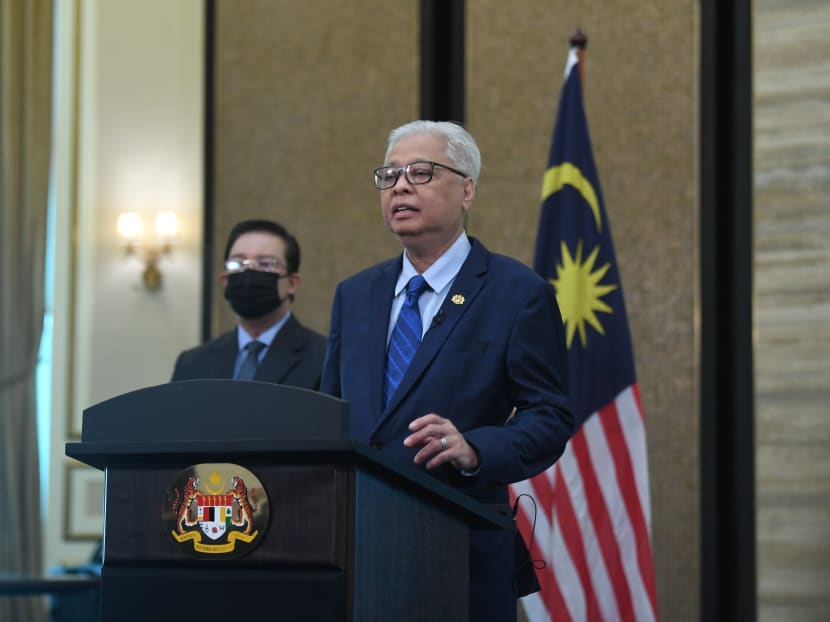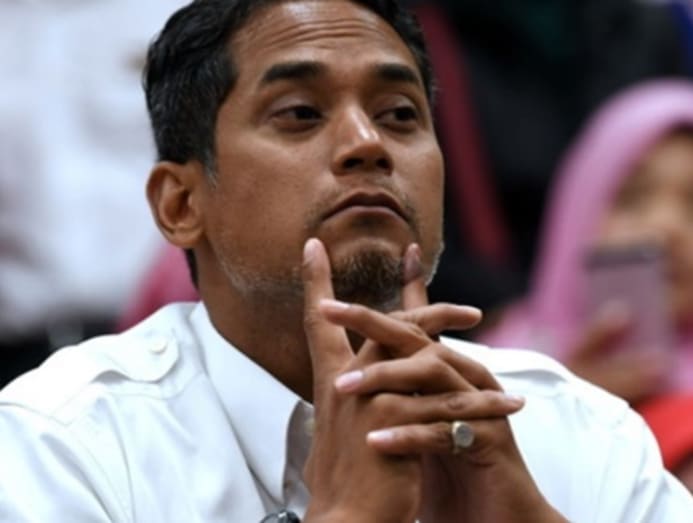Commentary: This new Malaysian Cabinet looks a lot like the old one
The new prime minister may seek continuity and unity in keeping to his predecessor’s formula, but at least UMNO’s gripes about the previous administration no longer hold water, says ISEAS-Yusof Ishak’s Francis E Hutchinson.

Malaysian prime minister Ismail Sabri Yaakob announces his new cabinet line-up. (Photo: Courtesy of Prime Minister's Office)
SINGAPORE: Insofar as administrative resets and political relaunches go, yesterday’s swearing-in of Malaysia’s new Cabinet felt like the Friends Reunion Special — a gathering of familiar faces linked by a series of complicated backstories.
Indeed, according to one pundit’s calculation, the composition of prime minister Ismail Sabri Yaakob’s cabinet was 87 per cent, the same as his predecessor’s. The new crop of policymakers comprises 31 ministers and 38 deputy ministers — the same as its forerunner.
This expansive selection illustrates the challenges inherent in maintaining a veneer of unity across the ruling coalition’s four blocs as well as within them. Its two alpha males, the United Malays National Organisation (UMNO) and Parti Pribumi Bersatu Malaysia (Bersatu) are themselves divided into three fractious factions each.
VIRTUALLY IDENTICAL UPPER ECHELONS
Aside from the prime minister, the upper echelons of the incoming Cabinet are virtually identical to their predecessors.
As with the Perikatan Nasional (PN) administration for most of its existence, there is no deputy prime minister. This sidesteps offending either UMNO or Bersatu — both of whom desperately want the position — and precludes precocious deputies with ill intentions.
Ismail Sabri also kept former prime minister Muhyiddin Yassin’s senior ministerial positions and power-sharing formula — Bersatu with two (Azmin Ali in International Trade and Industry and Radzi Jidin in Education), UMNO with one (Hishammuddin Hussein in defence), and Gabungan Parti Sarawak (GPS) with one (Fadillah Yusof in works).
Along with Azmin, the other members of the economic team are identical. The former banker Tengku Zafrul Abdul Aziz remains in finance, and Bersatu stalwart Mustapa Mohamad stays as minister for the economy.
While this provides continuity in the run-up to the Budget in October and the much-awaited 12th Malaysia Plan, this team also drew much criticism for its overly cautious approach to combatting the COVID-19 induced economic downturn.
Other vestiges of Muhyiddin’s intricate coalition-building formula are visible everywhere. Bersatu party supremo Hamzah Zainuddin remains at the helm of home affairs, as does Noraini Ahmad (UMNO) for higher education and Ronald Kiandee (Bersatu) for agriculture and food industries. The Barisan Nasional component members, the Malaysian Chinese Association, and the Malaysian Indian Congress retain transport (Wee Ka Siong) and human resources (M Saravanan), respectively.
The only appointment that generated buzz was the movement of Khairy Jamaluddin (UMNO) from science, technology and innovation to health.
Khairy, one of that party’s most popular members, won kudos for stepping beyond the scope of his previous ministry to take charge of Malaysia’s vaccination programme. Despite a slow start, the pace of inoculations has dramatically picked up — with 1 to 2 per cent of the population now vaccinated every day.
POSITIVE RESHUFFLE OUTCOME FOR UMNO
In addition to securing the prime minister position, UMNO did better out of the recent reshuffle largely at Bersatu’s expense, increasing its number of ministers from 9 to 11 and deputy ministers from 8 to 10. Thus, its Members of Parliament (MPs) now helm the ministries of rural Development, housing and local government, and communication and media.
The first two control big budgets, have substantial staff numbers and are useful for nurturing the grassroots. The third is key for controlling Malaysia’s media landscape — which for all the buzz around Facebook and Instagram — is still shaped by traditional outlets such as print and television
Listen to political observers discuss the new Malaysia prime minister and what it means for UMNO and the country:
In return, Bersatu was offered the prestigious but outwardly focused foreign affairs and the smaller plantation and commodities portfolios.
GPS, the other crucial coalition component, retained its cabinet allocation of four ministries.
The final coalition member is the low-key but cohesive Islamist party, Parti Islam SeMalaysia (PAS). While its MPs still head only three ministries, it has now secured the religious affairs portfolio. Although this ministry comes under the Prime Minister’s Department, this is the first time PAS has held this uber-sensitive position.
LOST OPPORTUNITY FOR A POLITICAL RESET?
With Ismail Sabri’s A-team named, UMNO’s long-standing gripes that the previous PN administration was unsatisfactory do not hold water anymore. The key actors in that administration’s COVID-19 combat force were all UMNO members: Khairy Jamaluddin, Adham Baba, and Ismail Sabri himself. All three remain as anchors of the new cabinet.
Moreover, even by Malaysia’s rather staid standards, Ismail Sabri seems determined to set new benchmarks. He retained the under-performing Rina Harun (Bersatu) in women, family, and community development and the much-maligned Adham Baba (UMNO) was shifted from Health to Science, Technology, and Innovation.
Conversely, more reformist and popular figures such as former deputy speaker Azalina Othman, UMNO deputy president Mohamad Hasan, and UMNO vice-president Khaled Nordin were conspicuously omitted.

In keeping the baby, the bathwater, and the bubble bath, Ismail Sabri has lost an opportunity for a political reset.
His focus on shoring up his fragile coalition has ensured continuity but sacrificed its honeymoon period. As a result, instead of beginning anew from today, this administration will be lumped together with its predecessor – and judged accordingly.
This now leaves Ismail Sabri’s Cabinet in much need of some mojo. The incoming law minister Wan Junaidi has stated that his priorities include reforming Parliament, introducing term limits for prime ministers, and revisiting relations with East Malaysia.
If the members of the new Cabinet do not generate some buzz, they may need to at least talk about inspiring ideas.
Francis E Hutchinson is a Senior Fellow and coordinator of the Malaysia Studies Programme at the ISEAS – Yusof Ishak Institute. This commentary was first published on ISEAS-Yusof Ishak Institute's Fulcrum.





